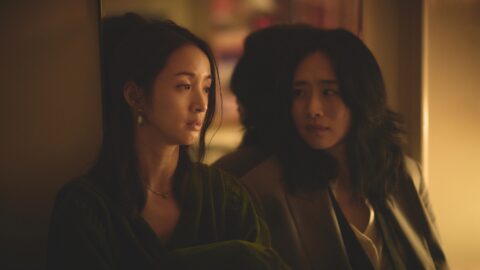The preponderance of optical motifs in Blind Love (2025) incessantly emphasise a glossy vision of enlightenment.
Julian Chou’s queer love story fitfully overcomes its earnestly liberal overtures toward inclusivity only when the writer-director’s infatuation with aestheticised miserablism doesn’t overwhelm the talents of its talented cast. The flashes of pathos make the plot’s pitfalls and thematic superficiality that much more frustrating.
Chou’s central characters, a bourgeois Taiwanese family, are provided ample space for exploration across the film’s generous running time. The central dynamic is shared between Shu-yi (Ariel Lin) and her oldest son Han (Jimmy Liu), who both bristle under the callous ruthlessness of father and breadwinner Feng (Frederick Lee), a doctor gunning for a promotion to the role of hospital director. Yet mother and son share an encounter, unbeknownst to either of them, with Xue-jin (Ke-xi Wu), an ophthalmologist (naturally) who was Shu-yi’s secret teenage sweetheart.
The newly divorced Xue-jin provides a symbolic promise of liberation for both Han and Shu-yi. She encourages the former to foster a talent in photography while carrying on a renewed tryst with the latter. The potential for psychosexual obsession lies latent in the film, alluded to most obviously in a framed poster of Vertigo (Alfred Hitchcock, 1958) on Han’s bedroom floor. Yet Chou discards this thread for heart-tugging catharsis, overlaying Chris Hou’s maudlin score over fastidiously-framed sex scenes between Shu-yi and Xue-jin. Any complexity or ambivalence is suffocated by the film’s simplistic portrayal of patriarchal oppression, with Feng proving a spectacularly dull villain.
It’s in minor moments where the film’s promise outshines its worst impulses. An extended sequence where Han and Xue-jin make love privileges largely stationary sequence shots that indicate the young man’s burgeoning kinship with femininity. It’s a subtly bold thread that provides the film its strongest throughline, yet in the process betrays Chou’s limited perspective by relegating the female protagonists to quietly suffering caricatures. Flashbacks that implicate Shu-yi’s recently deceased mother are underdeveloped at best, their inclusion ultimately adding little to a portrayal of intergenerational, female trauma.
Comparing Blind Love to the works of a cosmopolitan Taiwanese auteur like Edward Yang does the film no favours. Still, Chou invites the comparison, particularly to Yang’s masterpiece Yi Yi (2000). Yet Yang’s panoramic portraits were informed by a humanist understanding of the complicated ways people engage in geopolitical power shifts on a micro level. Chou can only wear his influences on his sleeve and hope that will suffice.
Nick Kouhi is a programmer and critic based in Minneapolis, Minnesota





